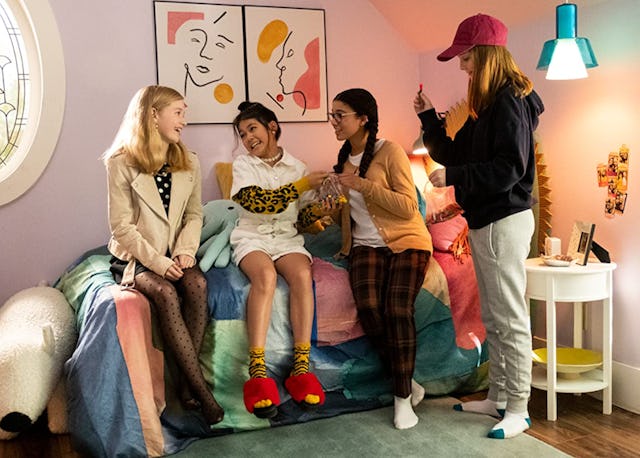Netflix Just Canceled The Best Show On TV For Preteen Girls
‘The Baby-Sitters Club’ meant a lot to my family and now it’s gone.

When Season 2 of The Baby-Sitters Club dropped, my 9-year-old daughter literally threw a party. She and her three closest friends ate pizza on the couch, giggled a whole lot, and were totally and completely transfixed by their very favorite show.
Now that Netflix has canceled the critically acclaimed, commercially successful show without explanation, I don’t know what my daughter and her friends will replace it with that could possibly live up to what it provided for them: a candid, real, and empowering window into what it feels like to be a preteen girl, in all of its joys and complexities.
Why did a show that was literally the best-reviewed Netflix show in history, with a 100% approval rating on Rotten Tomatoes get canceled? The show’s creator, Rachel Shukert, told Vulture in a must-read interview that there are likely two main reasons.
The first is that Netflix is completely focused on shows that are binge-worthy and that will tally new worldwide subscribers, and kids don’t binge The Baby-Sitters Club — or much of anything — because they aren’t allowed to watch TV like us adult slugs.
The second reason is that we don’t, as a society, give much of a crap for the interior lives of preteen girls or about offering them their own space.
Shukert says it best:
“People are extremely uncomfortable with this period in girls’ lives. It seems to be the time of life that girls lose faith in themselves, and I think it’s because they don’t see representation of where they’re actually at,” she tells Vulture. “Girls are expected to go straight from Doc McStuffins to Euphoria. They’re not ready for TV about having sex, but they don’t want to be little girls. So who are they? It’s a really easy time for girls to define themselves solely by how they’re seen by other people and then you don’t get your sense of self back until you’re 35. What if you weren’t missing those 20 years?”
“Girls are expected to go straight from Doc McStuffins to Euphoria.”
That’s why she set out to make The Baby-Sitters Club, a reboot of the beloved book series that many older millennial moms grew up with. A story of a group of diverse kids who have agency and big feelings and dreams — and who are grappling with a world they’re just getting to know.
“What if you always got to be yourself and see yourself represented in a real way,” Shukert asks. “And not have to be all about who thinks you’re pretty or who thinks you have the right clothes? Or how old they think you are or how old they think you look? The Baby-Sitters Club speaks to so many girls because it meets them where they are. It’s not about adults telling them who they are. It’s not really about boys, although they have crushes, which is a realistic part of life at that age.”
In two seasons, my daughter got to experience a show that was just for her — that met her where she was and didn’t talk down to her. And now it’s gone.
Part of the problem? We as a society don’t assign worth to art created by women or art meant for prepubescent girls. Netflix certainly doesn’t and consumers don’t — and even women are socialized to shrug off the importance of media made by us and for us.
“I think female audiences are trained to not take their own stories as seriously,” Shukert said. “Stuff men were obsessed with when they were 9 is treated like Hamlet. How many Spider-Man movies are there? How many Star Wars? They tell it over and over again from different perspectives. That’s all fine, obviously. But what if someone treated something for girls that seriously? Even with a fraction of the money.”
“Stuff men were obsessed with when they were 9 is treated like Hamlet. How many Spider-Man movies are there? How many Star Wars?”
I would kill to see even a fraction of that money and that importance placed on stories for younger girls and tweens. We see flashes of it — Greta Gerwig’s films Little Women and Lady Bird show us that it’s certainly possible and lucrative to make art about the interior lives of girls — but at the end of the day, when I want my kid to see herself depicted on screen in a real, convincing, thoughtful way, there just aren’t that many choices. And now there’s one fewer.
And it wasn’t canceled because it wasn’t good or important or successful. It was canceled because we don’t care enough about the needs of our young girls.
The Baby-Sitters Club was a show that my daughter and I could watch together and both genuinely enjoy. More than that, it was a show that we could talk about afterward and have real conversations about. One episode led us to talking about our Asian heritage with her in a way I had never managed to before. Another made it so easy and comfortable to discuss periods that I felt like I was cheating. It was heartfelt and it was truly made for my kid in a way I haven’t seen before.
We still have the books and the graphic novels (which are amazing) but the show is a huge loss — and it’s a loss that signals much bigger issues in children’s media.